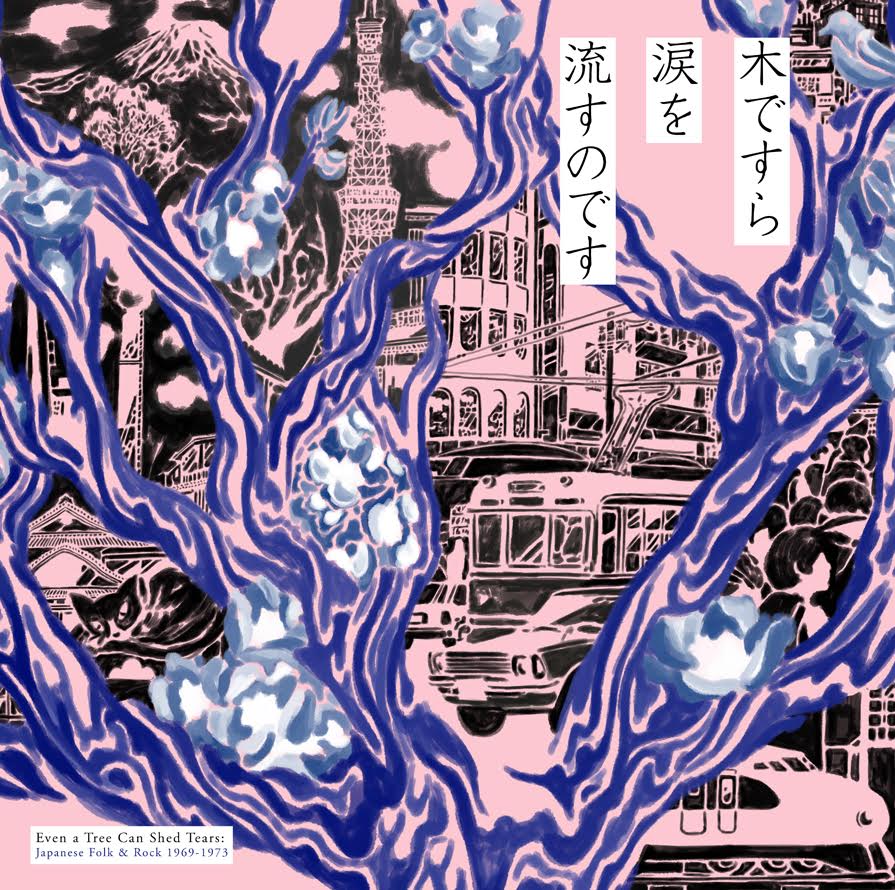This compilation offers a fascinating peek into the Japanese Folk and Rock movement of the late ‘60s and early ‘70s. Though influenced by Western music, the music contained on EVEN A TREE CAN SHED TEARS: JAPANESE FOLK & ROCK 1969-1973 is undeniably infused with a deep connection to their very own Japanese culture.
According to the press release, “There was something in the air in the urban corners of late ‘60s Japan. Student protests and a rising youth culture gave way to the angura (short for ‘underground’) movement that thrived on subverting traditions of the post-war years. Rejection of the Beatlemania-inspired Group Sounds and the squeaky-clean College Folk movements led the rise of what came to be known in Japan as ‘New Music,’ where authenticity mattered more than replicating the sounds of their idols.” Listening to these recordings, it is obvious that these artists created something special that embraced their Japanese culture while also remaining defiantly independent. This isn’t a compilation of Japanese Bob Dylan or James Taylor wannabes. No, this is something much different… and it is riveting from beginning to end
Those who do not speak Japanese – myself included – must rely on the feeling, the performance and passion behind each song in order to truly appreciate each track. Even with the helpful liner notes, the listener must immerse themselves in the music. Thankfully, each track chosen for this collection reaches out and grabs the listener on first listen. Most of the tracks are gentle and reveal their beauty during that first spin. Sachiko Kanenabu’s “Anata Kara Touku E” is haunting yet beautiful. Kazuhiko Kato’s “Arthur Hakase No Jinriki Hikouki” sounds like a Donovan song that made it’s way onto The Beatles’ WHITE ALBUM – which doesn’t seem so far-fetched since Donovan spent time with the Fabs in Rishikesh in 1968. Takashi Nishioka’s “Man-in No Ki” blends traditional Japanese Folk music with a nod to Western Psych-Folk. Maki Asakawa’s “Konna Fu Ni Sugite Iku No Nara” is a beauty of a song built around an acoustic reinvention of standard rock chord progression. Hachimitsu Pie’s “Hori No Ue De” sounds like a sorrowful plea inspired by CSNY’s “Helpless” if it had appeared on Carole King’s TAPESTRY. Neil Young’s influence also bleeds into Ryo Kagawa’s “Zeni No Kouyou Ryoku Ni Tsuite”.
With performances that range from wistful to dramatic, EVEN A TREE CAN SHED TEARS: JAPANESE FOLK & ROCK 1969-1973 is an eye (and ear) – opening experience for anyone remotely interested in Folk and Protest music. Even with the language barrier, this release reveals so much about this time period in Japan. This is not just a release for Rock historians – it is a collection that will resonate with listeners nearly 50 years after it was recorded.
Keep on truckin’,
Stephen SPAZ Schnee

